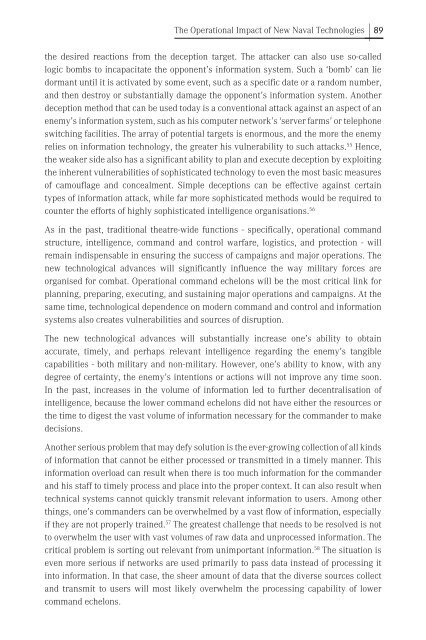THE FUTURE OF SEA POWER
SPC2015_Proceedings
SPC2015_Proceedings
Create successful ePaper yourself
Turn your PDF publications into a flip-book with our unique Google optimized e-Paper software.
The Operational Impact of New Naval Technologies | 89<br />
the desired reactions from the deception target. The attacker can also use so-called<br />
logic bombs to incapacitate the opponent’s information system. Such a ‘bomb’ can lie<br />
dormant until it is activated by some event, such as a specific date or a random number,<br />
and then destroy or substantially damage the opponent’s information system. Another<br />
deception method that can be used today is a conventional attack against an aspect of an<br />
enemy’s information system, such as his computer network’s ‘server farms’ or telephone<br />
switching facilities. The array of potential targets is enormous, and the more the enemy<br />
relies on information technology, the greater his vulnerability to such attacks. 55 Hence,<br />
the weaker side also has a significant ability to plan and execute deception by exploiting<br />
the inherent vulnerabilities of sophisticated technology to even the most basic measures<br />
of camouflage and concealment. Simple deceptions can be effective against certain<br />
types of information attack, while far more sophisticated methods would be required to<br />
counter the efforts of highly sophisticated intelligence organisations. 56<br />
As in the past, traditional theatre-wide functions - specifically, operational command<br />
structure, intelligence, command and control warfare, logistics, and protection - will<br />
remain indispensable in ensuring the success of campaigns and major operations. The<br />
new technological advances will significantly influence the way military forces are<br />
organised for combat. Operational command echelons will be the most critical link for<br />
planning, preparing, executing, and sustaining major operations and campaigns. At the<br />
same time, technological dependence on modern command and control and information<br />
systems also creates vulnerabilities and sources of disruption.<br />
The new technological advances will substantially increase one’s ability to obtain<br />
accurate, timely, and perhaps relevant intelligence regarding the enemy’s tangible<br />
capabilities - both military and non-military. However, one’s ability to know, with any<br />
degree of certainty, the enemy’s intentions or actions will not improve any time soon.<br />
In the past, increases in the volume of information led to further decentralisation of<br />
intelligence, because the lower command echelons did not have either the resources or<br />
the time to digest the vast volume of information necessary for the commander to make<br />
decisions.<br />
Another serious problem that may defy solution is the ever-growing collection of all kinds<br />
of information that cannot be either processed or transmitted in a timely manner. This<br />
information overload can result when there is too much information for the commander<br />
and his staff to timely process and place into the proper context. It can also result when<br />
technical systems cannot quickly transmit relevant information to users. Among other<br />
things, one’s commanders can be overwhelmed by a vast flow of information, especially<br />
if they are not properly trained. 57 The greatest challenge that needs to be resolved is not<br />
to overwhelm the user with vast volumes of raw data and unprocessed information. The<br />
critical problem is sorting out relevant from unimportant information. 58 The situation is<br />
even more serious if networks are used primarily to pass data instead of processing it<br />
into information. In that case, the sheer amount of data that the diverse sources collect<br />
and transmit to users will most likely overwhelm the processing capability of lower<br />
command echelons.


